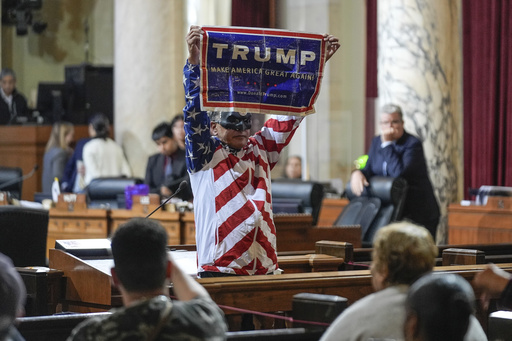
LOS ANGELES — The Los Angeles City Council has taken a significant step by greenlighting an ordinance aimed at designating the city as a “sanctuary city.” This new law prohibits the use of city resources for immigration enforcement, ensuring that city departments do not share information regarding individuals without legal status with federal immigration officials. This action comes as a precautionary measure in light of anticipated large-scale deportations under the incoming administration of President-elect Donald Trump.
The council members voted unanimously in favor of this measure, aligning with a growing number of cities across the U.S. that have enacted similar laws. Although “sanctuary city” is not a formal legal term, it has become emblematic of a commitment to protect immigrant populations by refusing to voluntarily assist immigration enforcement agencies. Proponents argue that such ordinances create safe environments for immigrants, allowing them to report crimes without the fear of deportation.
The ordinance will return to the council for a second vote, a procedural step, and Mayor Karen Bass has expressed her support for the measure, which could be subject to her veto power. As Trump is expected to reintroduce stringent immigration policies upon taking office, advocates have urged local leaders to act quickly.
Councilmember Hugo Soto-Martinez emphasized the importance of this ordinance, stating that it sends a clear signal that Los Angeles will not collaborate with the Immigration and Customs Enforcement (ICE). He expressed the desire for residents to feel secure enough to seek help, particularly in cases of domestic violence and other crimes, without fearing deportation.
Soto-Martinez noted that many of his constituents, including his parents, are immigrants without legal status, highlighting the significant contributions they make to society, from household work to childcare.
Despite the approval of the ordinance, its impact may be limited, given that city policies already discourage cooperation with federal immigration authorities. For instance, the Los Angeles Police Department has a standing policy of not inquiring about a person’s immigration status. The recently appointed police chief, Jim McDonnell, reaffirmed this stance by promising not to participate in mass deportations or engage with federal immigration enforcement.
Previous initiatives by former Mayor Eric Garcetti in 2019 offered protections to undocumented immigrants, but the new ordinance aims to formalize these protections into law. California has similar laws statewide, with former Governor Jerry Brown implementing sanctuary state legislation in 2017 to prevent local law enforcement from inquiring about immigration status or aiding in federal enforcement efforts.
In the past, the Trump administration sought to penalize sanctuary cities by threatening to withhold federal funding, favoring cities that agreed to cooperate with immigration enforcement efforts.
Cities like New York and San Francisco have established long-term policies in support of immigrant rights. However, critiques of these policies have surfaced amid an increase in migrant arrivals, intensified by political maneuvers from Republican leaders in states like Texas and Florida, who bus migrants to Democratic-led urban areas.
New York City Mayor Eric Adams has pushed for greater collaboration between local law enforcement and federal authorities, deeming existing sanctuary policies as potentially harmful to public safety. Los Angeles has seen a similar trend, albeit with fewer migrants being relocated to the city.
On the day of the vote, over a hundred advocates gathered outside city hall to support the ordinance. Martha Arévalo, the executive director of the Central American Resource Center in Los Angeles, remarked that the law is timely and essential for the community. She connected the current political climate to Trump’s previous rhetoric regarding immigration, which she characterized as divisive and harmful.
Supporters of the ordinance, many of whom are undocumented immigrants, shared their personal narratives concerning the fear of deportation. Harvard Law School student Jesus Carreon highlighted his struggles growing up in fear of separation from his family and urged the council to pass the sanctuary policy.
However, some opposition exists, with concerns that the ordinance might attract more immigrants without legal status, potentially straining the city’s resources for homelessness. Resident Charles Brister voiced this sentiment at the council meeting, emphasizing the existing needs of homeless American citizens.
In summary, Mayor Bass acknowledged that this is a crucial moment for immigrant protections, asserting that such measures strengthen communities and contribute positively to the city’s overall welfare.
